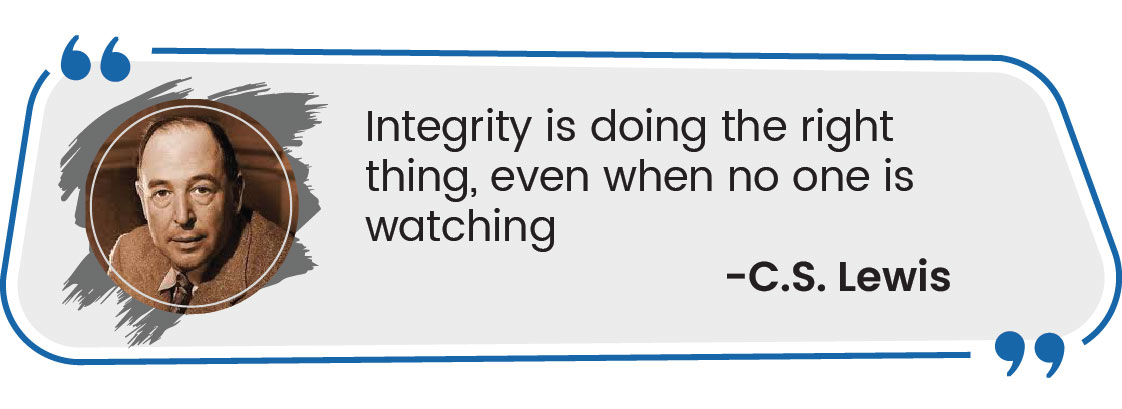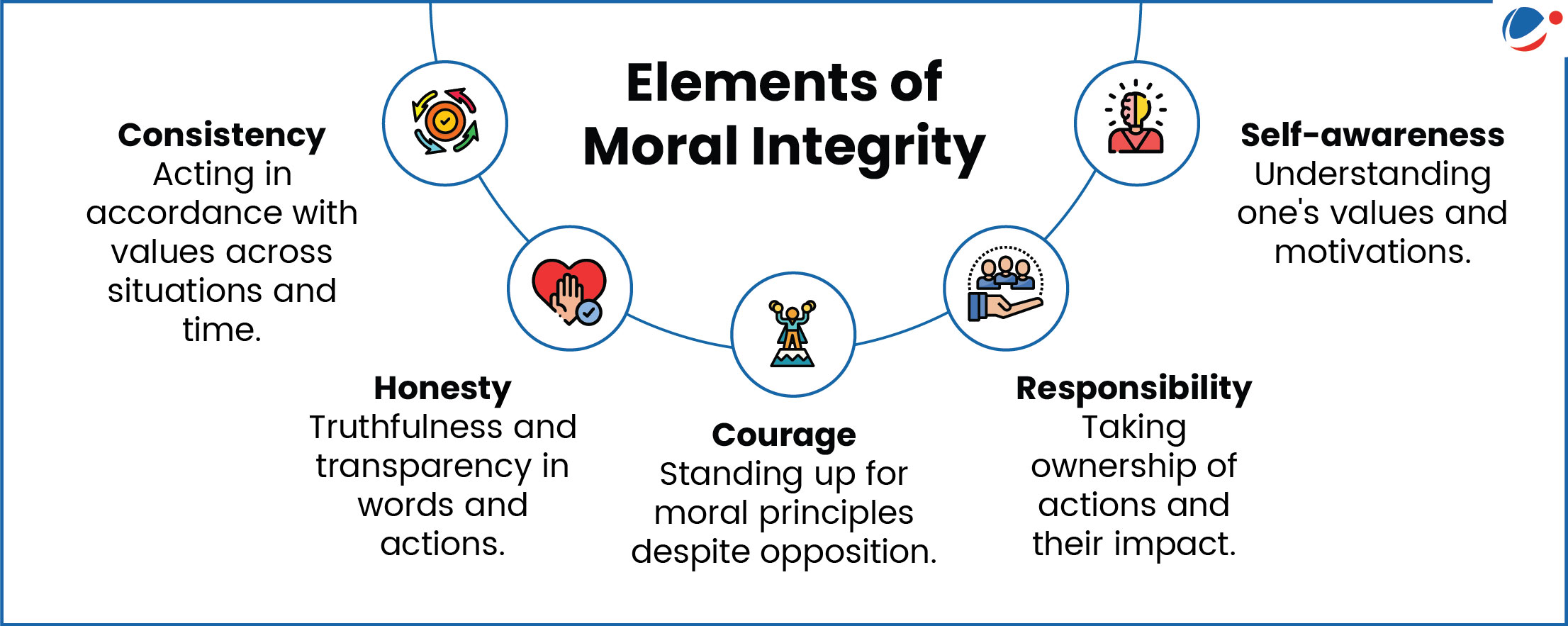
Introduction
Recently, Supreme Court Judge Justice Surya Kant remarked that moral integrity is a guiding force that does not terminate paths, but rather defines them. This underscores that integrity is not a limiting factor; instead, it shapes ethical direction, enabling decisions grounded in justice, fairness, and accountability.

What is Moral Integrity?
- Definition: Moral integrity is the steadfast adherence to ethical principles and values even in difficult circumstances.
- It involves internal consistency between one's beliefs, speech and actions, ensuring that decisions and behaviors align with a set of moral standards regardless of external pressures or temptations.
Key Stakeholders and their Interests
Stakeholder | Interests / Concerns |
Individuals | • Building personal credibility and trustworthiness. • Developing moral courage to resist corruption in daily life. |
Public Servants | • Upholding probity and impartiality in governance. • Preventing misuse of office for private gain. • Delivering citizen-centric governance based on transparency and accountability. • Protecting against political pressure and institutional corruption. |
Judiciary | • Acting as guardians of constitutional morality and justice. • Ensuring impartial decisions without political or social influence. |
Corporate Leaders | • Maintaining ethical business practices that ensure long-term sustainability. • Building investor and consumer confidence through integrity-driven policies. |
Political Leadership | • Serving public interest rather than personal or party gains. • Upholding democratic values of fairness, equality, and inclusivity. • Ensuring policies and decisions are morally sound and people-centric. |
Society at Large | • Cultivating a culture of honesty, fairness, and justice. • Protecting against erosion of values due to greed, materialism, or impunity. • Ensuring sustainable governance, ethical leadership, and social cohesion. |
Factors Inhibiting Moral Integrity
- Conflict of Interest: Personal gain versus public duty can compromise decision-making.
- E.g. In the 2G Spectrum case, allocation of licenses favored vested interests, undermining public trust.
- Institutional and Systemic Pressures: Unrealistic targets, bureaucratic red tape, and political interference may push individuals to compromise on ethical choices.
- E.g. Cases like the Vyapam Scam in Madhya Pradesh show how institutional weakness undermines integrity.
- Greed and Materialism: Rising consumerism and desire for wealth & power drive unethical behavior.
- E.g. Corporate scandals like Satyam Scam were rooted in greed, leading to large-scale fraud.
- Lack of Transparency and Accountability: Opaque systems and a slow and inefficient judiciary create opportunities for manipulation and ethical compromise.
- E.g. Before RTI Act, 2005, lack of access to government information enabled unchecked corruption in welfare schemes.
- Peer and Social Pressures: Conformity to group behavior, fear of consequences (like transfer), or desire for approval often overrides ethical principles.
- E.g. Edward Snowden faced backlash for exposing surveillance practices, showing the cost of going against the group.
- Unethical Behavior and Culture of Impunity: When corruption or unethical conduct goes unpunished, it discourages integrity.
- E.g. In electoral politics, candidates with criminal backgrounds often win, reinforcing the idea that unethical practices are rewarded.
Importance of Moral Integrity in Contemporary Times
- For Individuals
- Personal Credibility & Trustworthiness: A leader's moral integrity inspires faith.
- E.g. Ratan Tata exemplified moral integrity through ethical business practices, philanthropy, and humility.
- Moral Compass in Complex Situations: With rising ethical dilemmas (AI use for surveillance, climate justice), moral integrity helps make fair choices.
- E.g. Whistleblowers like Edward Snowden reflected the role of integrity in balancing security with freedom.
- E.g. Satyendra Dubey, an NHAI engineer, exposed corruption in the Golden Quadrilateral Project.
- Personal Credibility & Trustworthiness: A leader's moral integrity inspires faith.
- Public Administration & Governance
- Prevention of Corruption: Integrity curbs misuse of office for personal gain.
- E.g. IAS Officer Ashok Khemka consistently upheld probity despite frequent transfers.
- E.g. RTI Act in India empowers citizens to demand integrity from officials.
- Citizen-Centric Governance: Moral administrators focus on welfare rather than power.
- E.g. Metro Man E. Sreedharan ensured transparent contracts and timely delivery of projects.
- E.g. Singapore's public service code ensures impartiality and probity, making it a global benchmark.
- Restoring Public Trust: E.g. the Election Commission of India, through strict enforcement of the Model Code of Conduct, has built confidence in free and fair elections
- Prevention of Corruption: Integrity curbs misuse of office for personal gain.
- Judiciary Upholding Constitutional Morality: Judges must act with impartiality, resisting political or social pressures.
- E.g. Supreme Court decriminalized homosexuality in Navtej Johar Case (2018).
- Corporate Sector & Business Ethics
- Ethical Business Practices: Integrity prevents unethical shortcuts like tax evasion, labor exploitation, or environmental harm.
- E.g. Infosys under Narayana Murthy built a reputation for transparency, corporate governance, and fair employee treatment
- ESG (Environmental, Social, Governance) Norms: Framework for morally responsible corporations to tackle challenges of modern times.
- E.g. The automotive giant Toyota has committed to achieving net-zero emissions by 2050.
- Ethical Business Practices: Integrity prevents unethical shortcuts like tax evasion, labor exploitation, or environmental harm.
- Civil Society Activism & Journalism: Integrity ensures facts over sensationalism, and countering fake news.
- E.g. Ethical journalism became critical for saving lives during COVID-19 by checking spread of misinformation.
- E.g., Anna Hazare's anti-corruption movement.
- Technology & Digital Age: Decisions on surveillance, privacy, and algorithmic bias require moral integrity.
- E.g. Tim Berners-Lee, creator of the World Wide Web, advocates for an open, decentralized, and privacy-respecting internet
Conclusion
Moral integrity is the bedrock of a just and trustworthy society. It guides individuals and institutions to act ethically, even under pressure, ensuring fairness, accountability, and compassion in all spheres of life. Upholding integrity is not just a choice, it is the cornerstone for sustainable governance, ethical leadership, and a resilient democracy. As Mahatma Gandhi observed, "Morality is the basis of things and truth is the substance of all morality."



